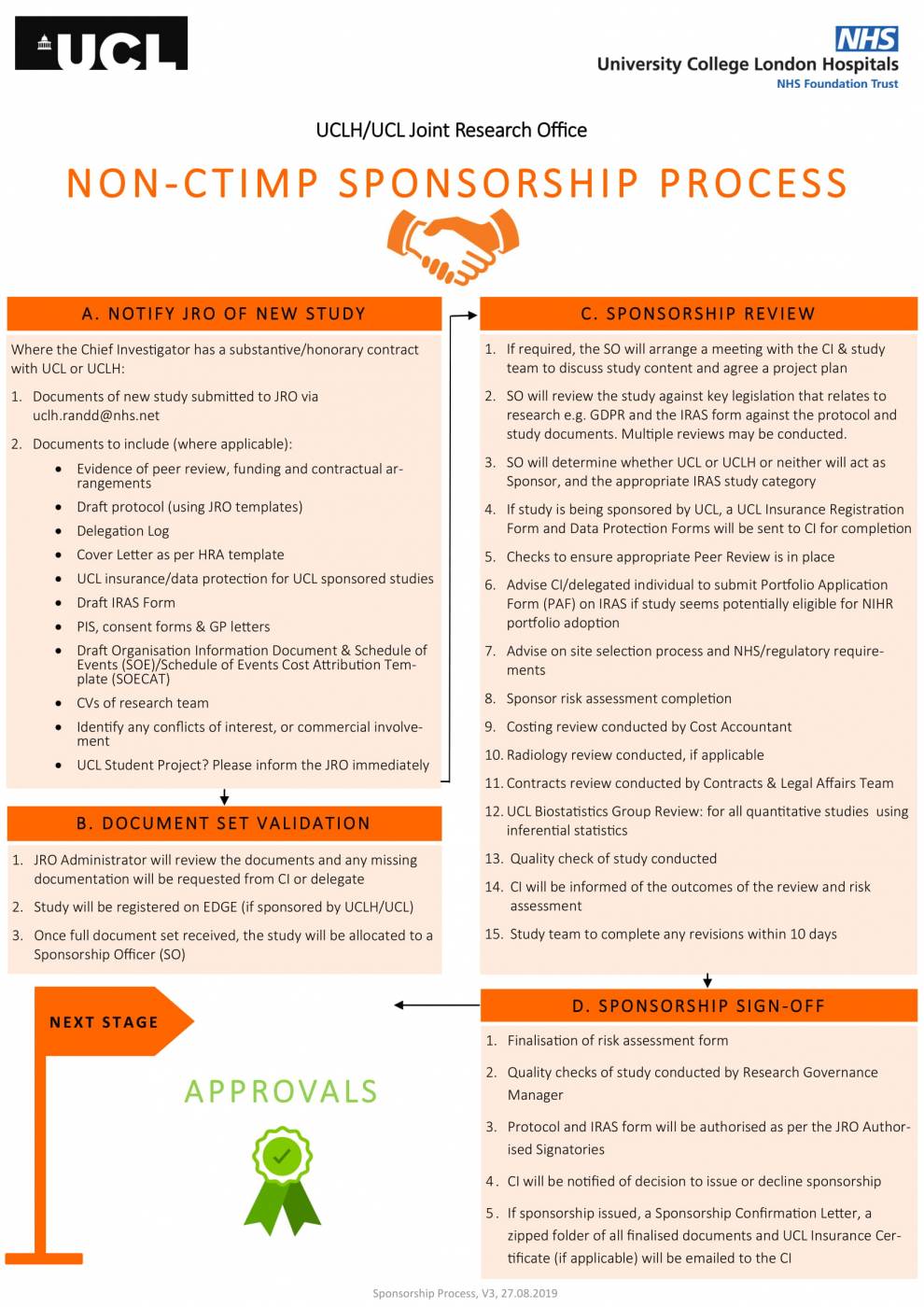All research studies taking place within health and social care and/or involving NHS patients, their tissue or information (data) must have a Sponsor.
A 'Sponsor' is the organisation, which takes ultimate responsibility for the initiation, management (or arranging the initiation and management) and/or financing (or arranging the financing) for that research. The sponsor takes primary responsibility that the design of the study meets appropriate standards and that arrangements are in place to ensure appropriate conduct and reporting.
UCL and UCLH will typically sponsor studies where the investigator has a substantive or honorary contract with the institution and where there is at least one UK site. The decision as to which institute should sponsor a study is determined by the JRO during the sponsorship approval process.
Healthy volunteer studies which are clinical trials of investigational medicinal products (CTIMP) will also require sponsorship. Other types of healthy volunteer study may not require sponsorship but will require a review by UCL ethics committee.
Please note that any studies or grant applications under review by the JRO that are dormant will be withdrawn and deregistered. This is defined as those which have not heard back from the study team within 12 months of initial registration. If desired, withdrawn studies can subsequently be reregistered and will be given a new local reference number. Any previous documents may have to be updated in line with regulatory updates and current best practice.
Please check the information below in the drop-down menus to identify the correct documents to draft and submit to the JRO to register your clinical research study, trial, or grant application.
Once you have collated your documents, email these as a compressed ZIP file to uclh.randd@nhs.net – or to ctimps@ucl.ac.uk if your study is a clinical trial of an investigational medicinal product or a regulated device.
Applying for Sponsorship
- Determine which department should support your application
Is your study research?
- No: You should discuss the proposal with you clinical or academic department. It is unlikely that your study requires the support of the JRO. Contact the JRO if you are unsure.
- Yes: Your study will need to be reviewed to determine if UCL or UCLH will sponsor. There are a few steps required to get to this decision. The JRO or a UCL Clinical Trials Unit will help you here. Please refer to the UCL Clinical Trials web portal to determine if the study falls within the scope of a CTU. If not, you should make contact with the JRO. A coordinator or advisor will be assigned to support you with the set-up of the study and determine the sponsor. If your study is a clinical trial of an investigational medicinal product or a regulated device, please make contact with the team specialising in these studies at ctimps@ucl.ac.uk otherwise, email the team at uclh.randd@nhs.net. The coordinator/advisor will support you with the grant application.
If you are unsure if your study is a clinical trial of an investigational medicinal product or a regulated device, please refer to the MHRA decision tools and the FAQs section of this website.
- Grant Submission
All studies which require a regulatory sponsor should have sufficient funding in place to cover its likely costs.
Grant applications which fall into the category of clinical research and are likely to require UCL or UCLH to act as a regulatory sponsor, should be reviewed by the JRO prior to submission (or where applicable, a clinical trials unit at UCL).
An organisation takes responsibility for the administration and management of the funds and terms contained within most grants. Grants for clinical research studies are processed through either UCL or UCLH.
Grants managed through UCL
Researchers at UCL should first read and follow the guidance from Research and Innovations Services on applying for funding from UCL. The required procedures for submission through UCL systems should be followed. UCL Research and Innovations Services will administer and manage the grant.
The JRO will advise on any regulatory and study management matters which may impact upon the funding requested in the application. The JRO will also advise on, and support the completion of, the SoECAT (where required by the funder). The feedback from the JRO should be incorporated into the application managed through UCL Research and Innovations Services.
At the end of this process, the JRO will provide the researcher with the necessary signatures and confirmations required for the grant submission.
The JRO will require at least 8 weeks’ notice for studies which are Clinical Trials of Investigational Medical Products (CTIMP), medical devices that require MHRA approvals and new interventions. A minimum of 4 weeks is required for all other studies.
Grants managed through UCLH
In some cases, a grant maybe processed through the NHS. The terms and conditions of the grant award will outline where this is expected or agreeable.
Such grants are managed through the procedures at the JRO. The majority costs are likely to be incurred at UCLH rather than UCL. Where UCL costs are required, researchers should follow the guidance of the necessary UCL department and UCL Research and Innovation Services to obtain these costs.
The JRO will advise on any regulatory and study management matters which may impact upon the funding requested in the application. The costings team will also advise on, and support with the completion of, the SoECAT (where required by the funder).
At the end of this process, the JRO will provide the researcher with the necessary signatures and confirmations required for the grant submission.
How to obtain JRO input to a grant application
Researchers with studies which fall into the following categories should contact the JRO to discuss their proposal prior to completing and documents:
Clinical Trials of Investigational Medical Products (CTIMP) Medical devices which require MHRA approvalsThe JRO coordinator and a specialist JRO cost accountant will work together to provide the final costs to the researcher for submission to the application. The cost accountant will also provide support with SoECAT requirements.
The researcher is responsible for converting these costs accurately into the application and in line with the requirements of the funder and UCL Research and Innovations Services (where applicable).
The coordinator will confirm “sponsorship in principle” and which organisation would act as sponsor (UCL or UCLH). This confirmation should not be considered as a full sponsorship approval. Full approval is subject to the award of the grant and the successful completion and authorisation of a full sponsorship review which will be conducted by JRO once the grant has been awarded.
For Sponsor representative signatures, the signatory is the Director or Deputy Director of Research Support. For NHS finance signatures, the signatory is the JRO Head of Finance.
- Significant issues/risks/concern: an internal referral to JRO leads for sponsorship and finance maybe required
Contact should be made via email: ctimps@ucl.ac.uk
For all other studies, all researchers should complete the grant submission request form and checklist. Both, alongside any required documents should be sent to randd@uclh.nhs.net.
Once received, a coordinator will be assigned.
The coordinator will conduct a review which will indicate which organisation (UCL or UCLH) would act as regulatory “Sponsor in Principle”. The coordinator will identify where additional costs may be required. These will relate to the management of the study such as archiving, regulatory fees, monitoring, supplies and audit.
In some cases, additional inputs maybe requested by the coordinator:
Collaborations or partnerships which involve commercial intent or significant partnerships: the advice from a JRO contracts manager will be sought Specialist services: the input from other departments at UCL or UCLH or costs from external providers maybe requested CRE/MPE reviews: UCL insurers: in some cases, a study falls outside of the usual cover permissible under UCL’s current insurance cover. This means an additional premium cost maybe required within the grant application (or agreement to cover this through other means)- Sponsorship Approval
The JRO coordinator or advisor assigned to your study will confirm full sponsorship and insurance cover and work with you to submit to the required regulators and ensure the correct documents are in place.
For studies which have been classified as Clinical Trials of Medicinal Products, your advisor will provide you with a list of required documents once they have discussed the study with you.
For all other studies, your coordinator will require the following information to begin the sponsorship process:
- Evidence of peer review (if applicable)
Draft protocol using the JRO templates
- Draft IRAS form
- Applicable draft Participant documents e.g., Participant Information Sheet, Consent Forms, GP letters
- Details of any statistical engagement
- CV of the Chief Investigator or Student (where applicable)
- Draft Statement Of Activities and Schedule Of Events
- Evidence of funding (where applicable)
- Details of any collaborations with external parties, including commercial entities and suppliers
- Any conflicts of interest
- Should your study be a Ctimp or Regulated Device, you should also submit a first contact questionnaire
Further documentation maybe requested by the JRO. Additional documentation will be dependent on the type of study and number of sites and collaborators.
The sponsorship review process will commence. This may consist of support and advice in the following:
- Study costing and financial management via the JRO finance team
- Legal and contractual matters via the JRO legal team
- Regulatory submissions via the JRO regulatory teams
- Study management and oversight advise via the JRO quality assurance teams
- Patient and Public engagement via the JRO PPI teams
- Medicinal Product support and vendor auditing via the JRO regulatory, pharmacy and PV teams.
- Confirmation of insurance cover
View a flowchart of the Non-CTIMP sponsorship process.

You can find sponsorship checklists, guidance and policies in the resources and templates pages.
At the end of the sponsorship process, you will be ready to submit the study to the relevant regulatory bodies and move onto the next stages - Assess, Arrange and Confirm.
Studies which use anonymous data from UCLH (only) may be eligible for a combined sponsorship and AAC process called the DAP-R. DAP-R is relevant for studies sponsored by UCL or UCLH only. See our Data pathways at UCL webpage for further information on the DAP-R and accessing data at UCLH.
 Close
Close


